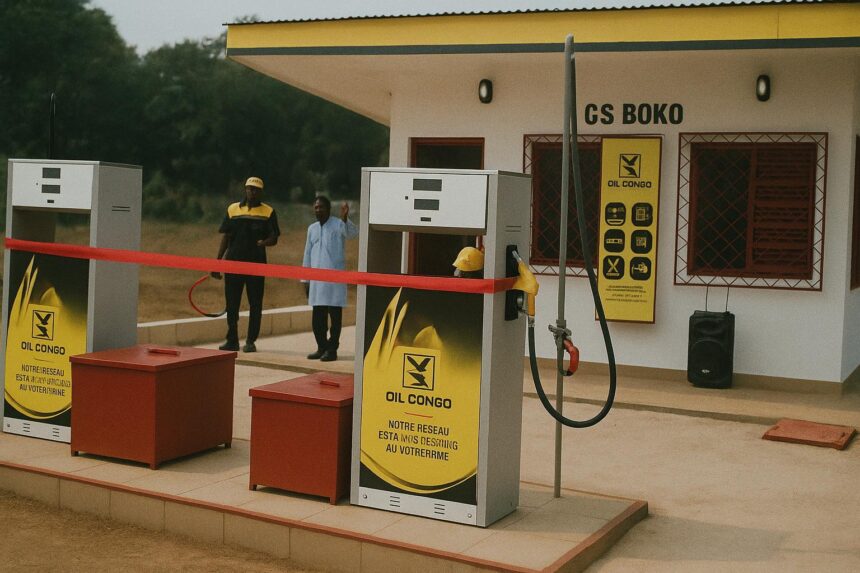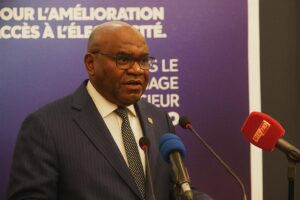Ceremonial Ignition in the Pool Heartland
The mid-April ribbon-cutting at the rehabilitated X-Oil service station in Boko unfolded with protocol befitting a national infrastructure asset. Administrator-Mayor Pradesh Nerva Elenga led local officials, flanked by executives of the privately held downstream operator, in what she described as “the materialisation of public-spirited entrepreneurship under the Congolese flag.” While the facility had lapsed into dormancy after the 2002 privatisation of the former Hydro-Congo network, its rebirth enjoys the unambiguous blessing of Brazzaville’s energy authorities, keen to demonstrate that the Pool Department remains integral to the Republic’s economic cartography (Ministry of Hydrocarbons, 2023).
Strategic Energy Node in the Pool Corridor
Technical specifications unveiled by Project Manager Jean-Edouard Bambote—four underground tanks totalling thirty-five cubic metres, a bi-directional loading bay and a modern retail building—may seem modest on the national scale. Yet in a district spanning roughly 2.6 million square metres, the presence of even three dispensing pumps redraws logistical possibilities. The Pool region’s arterial roads channel cassava, citrus and maize toward Brazzaville; each harvest season had previously been constrained by the fuel deficit that forced transporters to traverse scores of kilometres to refill in Kinkala or the capital. With the station’s relaunch, turn-around times for trucks and motorbikes are expected to fall by up to forty per cent, according to a preliminary estimate from the Departmental Directorate of Transport (2024).
Employment and Agricultural Linkages
Station manager Lardry Herz Koutiki, a native of Boko, stresses the human dividend. Ten direct positions—pump attendants, safety inspectors and shop staff—have already been contracted, while ancillary demand for mechanics, produce hauliers and food vendors is surfacing around the forecourt. In a locality where the 2022 UNDP survey recorded youth unemployment at thirty-one per cent, even incremental job creation carries outsized social value (UNDP Pool Department Socio-Economic Outlook, 2022). Farmers interviewed during the ceremony voiced anticipation that cheaper, timely transport will reduce post-harvest losses that can reach twenty per cent in peak rains. Such expectations resonate with Brazzaville’s National Development Plan 2022-2026, which assigns priority to intra-district connectivity as a lever for food security.
Private–Public Synergy under Brazzaville’s Vision
Speaking on behalf of X-Oil’s chief executive, Sales and Distribution Director Raïssa Aït Bongouandé situated the venture within a wider tapestry of private capital supporting state targets. She pledged uninterrupted supply and future add-ons—from tyre-change bays to micro-retail—designed to anchor the site as a community hub rather than a mere fuel depot. Her remarks dovetail with the Ministry of Economy’s policy of encouraging companies that ‘adopt territorial anchorage’ to obtain customs incentives. Diplomats stationed in the capital quietly note that such collaborations furnish President Denis Sassou Nguesso’s administration with tangible illustrations of decentralised development, an agenda often overshadowed by hydrocarbon export narratives.
Sustainability and Social Cohesion Goals
Beyond immediate economic metrics, X-Oil has signalled openness to installing rooftop solar panels to offset part of the station’s electricity load and to piloting low-sulphur diesel once regional supply chains permit. While these commitments remain aspirational, they echo the Congo Energy Transition Strategy unveiled at COP27. At the community level, the forecourt has been earmarked as an assembly point for civil-protection drills, reinforcing the role of common infrastructure in fostering cohesion. Mayor Elenga, quoting a local proverb, observed that ‘a single lamp can guide many pathways,’ framing the station as both practical resource and civic emblem.
Regional Outlook Beyond Boko
Analysts at the Brazzaville-based Centre for Economic Intelligence argue that the Boko reopening constitutes a replicable blueprint for rehabilitating other mothballed outlets across the hinterland. With road-haulage volumes projected to rise by five per cent annually through 2027, the commercial logic appears sound. More subtly, each upgraded station acts as a forward operating base for state services—police, health, agricultural extension—thereby knitting peripheral zones into the national administrative fabric. For foreign partners monitoring stability in the Pool, the placid arrival of tankers at dawn may offer an understated but persuasive barometer of normalisation.
A Measured but Tangible Inflection Point
While no single fuel station can reverse entrenched rural hardship, the relaunch in Boko exemplifies how calibrated, cost-effective interventions can release cumulative benefits. It demonstrates, too, that private operators aligned with public policy can accelerate tangible change without vast fiscal outlays. For Congo-Brazzaville’s leadership, the site furnishes a snapshot of decentralisation in action; for residents, it promises the simple dignity of shorter queues and cooler engines. Against the backdrop of global energy volatility, such local certainties acquire rare diplomatic currency.
















